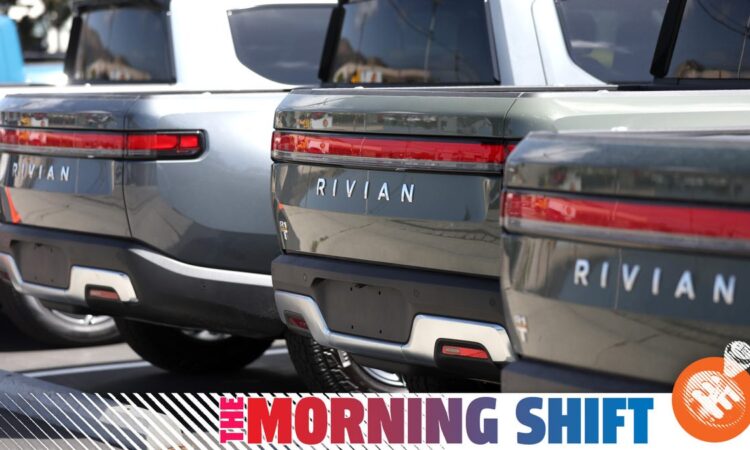
Rivian says it’s undeterred by its recent stumbles, General Motors has a plan for Europe, and Toyota’s investors in Europe really would prefer the company to cool it with all the lobbying on behalf of Big Oil. All that and more in this edition of The Morning Shift for Wednesday, May 10, 2023.
1st Gear: Patience
Rivian may have lost $1.35 billion in the first quarter of 2023 and built fewer than 10,000 vehicles over that span, but the electric truck maker doesn’t anticipate falling short of its full-year output target of 50,000 units. It was all by design, CEO RJ Scaringe told media and investors on a Tuesday earnings call, because the startup had to focus its efforts on finalizing its next-generation Enduro motor and iron-phosphate battery packs that will reduce manufacturing costs for future products. From Automotive News:
“Production in the first quarter was in line with our expectations and, as a result, we are reaffirming our production outlook for the year of 50,000 total units,” CEO RJ Scaringe said on the first-quarter earnings call Tuesday.
The industry newcomer posted revenue of $661 million for the quarter, which beat Wall Street estimates. Rivian’s share price rose about 5 percent in after-hours trading.
While Rivian continues to burn through cash, the company suggested it’s starting to turn the corner in terms of solving production bottlenecks and cutting costs. A big first step comes from using its own Enduro motor, first in EDV vans and later this quarter in the R1T and R1S.
“Enduro’s providing cost improvements that will result in a significant reduction in our bill of materials,” Scaringe said.
The costs of materials for EDV vans fell by 25 percent through the introduction of the Enduro electric motor and lithium-iron-phosphate battery packs. Previously, Rivian was using an outsourced motor and more expensive nickel-based battery cells in the vans.
While its consumer vehicles won’t receive the LFP packs immediately, about half of all R1 vehicles are expected to use the Enduro motor later this year, Scaringe said. The third-party motors will continue to be used on the other half.
Another issue is that Rivian’s factory was built to churn out about 150,000 trucks and vans every 12 months, and it’s currently operating at a fraction of that.
“Growing production volume improves fixed-cost leverage at our large-scale manufacturing plant in Normal, Ill.,” Scaringe said.
The goal, he added, is to reach profitability through the combination of production gains and cost cutting. Rivian is negotiating lower costs with its suppliers, he said.
Additionally, Rivian is building that cost savings into its next-generation R2 platform, which is now in development, Scaringe said. The future R2 vehicles, which will carry lower sticker prices, will be built at a future plant in Georgia starting in 2026.
Rivian says it can make it through 2025 entirely on its own given its $11.24 billion in cash and cash equivalents on hand. Scaringe doesn’t anticipate a price reduction of its range — Rivian’s only ever done the opposite and can’t afford to change its ways now — and last we heard in the fall, the brand had 114,000 outstanding reservations in North America. It’s all getting better for Rivian; these things just take time.
2nd Gear: GM of Europe
When GM gave Opel and Vauxhall to the PSA Group in 2017, it effectively exited the European market. It’s now planning a big re-entry, led by the Cadillac Lyriq in EV havens like Norway, the company’s executives recently discussed with Financial Times by way of Auto News:
GM’s European lineup will be an “all-electric portfolio” that will leverage the automaker’s EVs across more than one brand, GM Europe President Jaclyn McQuaid told Automotive News Europe on the sidelines of The Financial Times’ Future of the Car event on Tuesday.
McQuaid said GM’s EV sales will launch in the autumn but she did not disclose GM target markets in Europe.
A source familiar with the matter told Automotive News Europe that the automaker will target Nordic countries first. EV sales are booming in Norway where the government is chasing a target to have zero-emission cars account for all new vehicle sales by 2025. Other Nordic countries include Sweden, Denmark and Finland.
The Lyriq midsize crossover from GM’s Cadillac luxury brand will be on the launch list, the source said. […]
GM CEO Mary Barra said last year that she was “looking forward” to the company re-entering the European market as an electric-vehicle focused company.
Along with the Lyriq, other products that would fit with European tastes for smaller vehicles include the new Chevrolet Equinox compact crossover, which goes on sale in the U.S. this year priced from $30,000 (27,400 euros). An electric version of the Chevrolet Blazer midsize crossover is also expected this year.
The C8 Corvette is offered in Europe as well. But as with Ford’s larger all-electric products, it’d be unwise to expect trucks like the Silverado EV and GMC Hummer to make it across the pond. Ford is relying on the Volkswagen MEB-based Explorer to be its volume EV for the continent, but GM doesn’t really offer anything quite so attuned for European tastes. Not yet, anyway. The Bolt seemed to be a ringer for buyers there and GM used to sell it as the Opel Ampera-e, but that came to an end when the company washed its hands of the German marque. Yet another reason GM probably shouldn’t give up on the Bolt so soon.
3rd Gear: Toyota Buckles Down
Toyota’s new CEO Koji Sato has set his sights on a 10 percent rise in operating profit in 2023. He also hopes to sell five times the number of EVs by the close of the year compared to 2022, and a weak yen will likely help him do it. Courtesy Reuters:
Toyota forecast operating profit would rise to 3.0 trillion yen ($22.2 billion) this business year, in line with an analysts’ average forecast of 3.02 trillion yen.
That target came after operating profit for the fiscal fourth quarter through March surged more than a third to 626.9 billion yen – easily ahead of the average 553.46 billion yen profit estimated by 10 analysts, according to Refinitiv data.
Toyota’s strategy has seen it come under pressure in China, the world’s biggest auto market, where nimble local brands such as BYD Co Ltd have moved aggressively with battery EVs, weakening dominance of established foreign brands.
But Sato said the demand for purely battery-powered vehicles in China largely represented a new need in the market and was separate from demand for hybrid vehicles.
“We would like to work on both sides,” he said.
The profit target has been helped by a weak yen boosting the value of overseas sales, and higher output volumes that outweighed the impact of surging materials costs. Reflecting the impact of the weak yen, revenue for the business year that ended in March this year grew to a record 37.15 trillion yen.
Toyota’s EV numbers are not great — it sold just 38,000 fully-electric models between itself and Lexus in the fiscal year that ended in March — so none of this should be exceedingly difficult.
4th Gear: Toyota Has Been Asked to Cool It With the Lobbying
In other Toyota news, the company’s European investors are getting rightfully concerned about the degree of anti-climate lobbying the global automotive monolith and EV naysayer engages in, and have asked it to be a little more forthcoming about disclosing its political posturing. Toyota’s answer appears to be a resounding “no.” From Bloomberg:
A resolution was submitted by three funds that together hold $400 million in Toyota shares — Danish pension fund AkademikerPension, Norwegian financial services company Storebrand Asset Management AS and Dutch group APG Asset Management NV — on Wednesday before Toyota announced earnings in Tokyo.
Toyota’s board opposed it, citing past and ongoing efforts to make such disclosures since 2021 and reduce harmful emissions as part of its goal to expand electric vehicle production and become carbon neutral by 2050. […]
The funds’ proposal called on Toyota to conduct and publish an annual review of its climate-related lobbying activities and determine how they reduce its climate risks and reflect the goals put forward by the Paris Agreement. The proposal also said the company’s second and most recent report on climate lobbying falls short of industry standards.
Such disclosures could serve to mitigate reputational and other risks, the proposal reads, including potential backlash from customers, business partners, employees and investors.
“From an investment perspective, we’re concerned that Toyota is missing out on profits from soaring EV sales, jeopardizing its valuable brand, and cementing its global laggard status,” Anders Schelde, chief investment officer at AkademikerPension, said in a statement. “We need concrete policy changes and a better annual review drawing on independent data to calm international investors.”
These are all reasonable things to ask for, and it’s entertaining to watch Toyota expect anyone to take it seriously on its commitment to EVs as it’s simultaneously giving Chevron a run for its money.
5th Gear: Cake Flies at the Volkswagen Function
Volkswagen’s earnings meeting in Berlin on Wednesday was to be a rather predictable affair, with investors throwing barbs over Volkswagen’s flailing stock price and Oliver Blume having too much power, the only things investors care about. But it was derailed by activists protesting the company’s Xinjiang, China plant, where the company has repeatedly denied that it’s using forced labor of Uyghur workers. Cake was even thrown — at a Porsche, no less! Per Reuters:
About ten activists, including one topless woman with ‘Dirty Money’ painted on her back, interrupted executives’ speeches, shouting that the carmaker’s vehicles were built with forced labour and waving banners that read: ‘End Uyghur Forced Labour’.
One threw a cake at Wolfgang Porsche, chairman of Porsche SE, but missed, with crumbs flying in the direction of Volkswagen Chairman Hans Dieter Porsche who was speaking at the podium.
All activists were rapidly escorted out by security staff.
“A constructive dialogue is important. And a general meeting offers a good opportunity for this. With the exception of a few people, everyone follows the designated guidelines,” a Volkswagen spokesperson said.
Ralf Brandstätter, who runs Volkswagen’s operations in China, visited the plant in question in February and confirmed that everything at the site was going swimmingly and above board. There’s your answer, folks! What happened to taking men wearing suits saying “there’s nothing to see here” at their word?
Reverse: Big Railroad
It was on this day in 1869 — 154 years ago — that the Union Pacific and Central Pacific railroads were joined with one final spike. From History.com:
Neutral: I’m Back
I was in Wisconsin all weekend for a family event, and it was my first time in the state. Review: good curds and damn, y’all really like beer don’t you?






